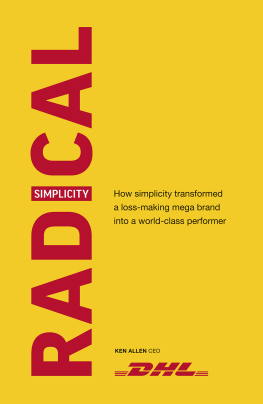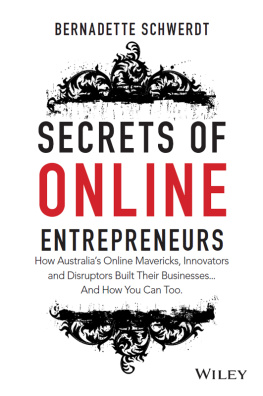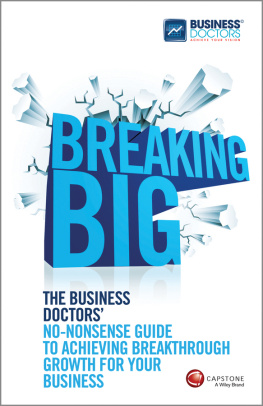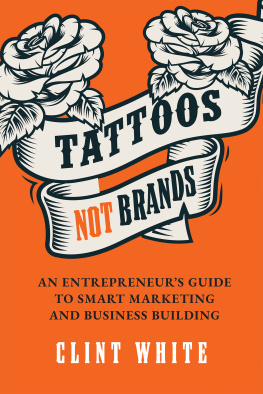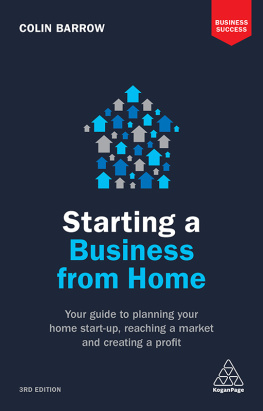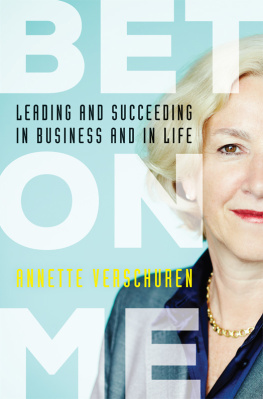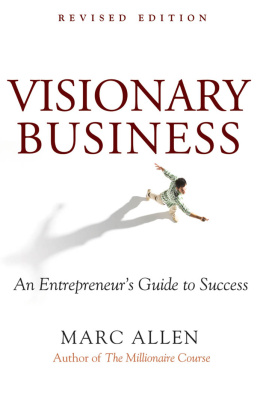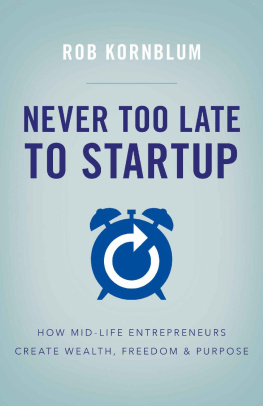
RADICAL SIMPLICITY
How simplicity transformed a loss-making mega brand into a world-class performer
KEN ALLEN

CONTENTS
ABOUT THE AUTHOR
Ken Allen is the CEO of DHL the worlds largest employer and most international company, with operations in 220 countries and territories.
Ken is a no-nonsense, miners son from Yorkshire, credited with DHLs astounding financial turnaround after years of stagnation and loss.
When he isnt running the show as global CEO, he is travelling around the world, sharing the secret to his success. He has rung the bell on Wall Street, shaken hands with the pope, consulted with the Prime Minister of France, and even met the Rolling Stones.
To my friends and family, especially my wife Gigi, without whose support this book wouldnt have been possible and who have been so accepting of my constant preoccupation with getting it finished. I dedicate it to my beloved children, Lisa, Danielle, Nicole and Alexander. You are the sons and daughters of lifes longing for itself. (Taken from The Prophet, by kahlil Gibran, Knopf 1923). I simply wish you long, healthy and happy futures.
Picture Credits
. Authors personal collection
. Authors personal collection
. Courtesy of DHL
. Courtesy of DHL and Wirtschaftswoche Magazie Handelsblatt GmbH. All rights reserved
. Courtesy of DHL
. Courtesy of DHL
. Courtesy of DHL
. Courtesy of DHL
. Authors personal collection, courtesy of DHL, and courtesy of Richard Bell. All rights reserved
. Courtesy of DHL, and used with permission of NYSE Group Inc
. Courtesy of CNN, and courtesy of DHL
. Courtesy of DHL and the Disaster Response Team
. Courtesy of DHL and authors personal collection
. Courtesy of DHL
. Courtesy of DHL
. Authors personal collection, and courtesy of DHL
PREFACE:
DHL, THE MATURE DISRUPTOR
Every day, a little miracle happens, some one million times. Someone, who could be anywhere in the world, from Manila to Manchester or from Bhutan to Bolivia, will receive a package. It could contain an item of clothing theyve been eagerly awaiting something theyve purchased on the Internet, perhaps. Or it could contain a replacement part for a machine their business relies on that is running worryingly close to breaking point. Whether they are delighted, relieved, impressed or disappointed with their purchase, they will probably spare little thought for the delivery driver whose touchscreen they scribbled their signature on when they took delivery of the package. And they will spare even less thought for the sorting centre operators, the airside workers, the customs brokers or the service centre leaders who worked together all over the world, in order to ensure that their purchase arrived at its destination on time.
In 1969, two monumental events took place. The first was that man walked on the moon for the first time, fulfilling the goal that JFK had set in 1962 the famous one small step for man, one giant leap for mankind. The second event was the establishment of DHL in San Francisco and this was another major step that would shrink the world.
DHL was a true pioneer in a new industry that became known as international express delivery. The company was a classic start-up: it might have had limited funds, but it was massively entrepreneurial, fast-growing, extremely customer-focused and had a truly committed workforce. Unfortunately however, it struggled to be profitable, to the extent that in 2002, 33 years after the company had been founded, it was losing over 150 million a year. Despite this, it was a strong global brand, a fact that led to its acquisition by Deutsche Post.
In 2008, with the global financial crisis on the horizon, the company, which was by then almost 40 years old, was almost bankrupt, having accumulated losses of 2.2 billion in that year. In 2009, Ken Allen, then a veteran of the Express part of the business who had been working at the company for 24 years, was promoted to the position of global CEO. Over the next ten years, Ken and his team achieved one of the greatest turnarounds in the history of the transport and logistics industry. They adopted a simple, people-based approach to the business by focusing on motivating their staff to deliver great service quality, which resulted in loyal customers and a profitable network. Express is now the best-performing division in the Deutsche Post DHL Group: it generated earnings in excess of 1.9 billion in 2018 (with a 12 per cent margin) and was voted the sixth best place in the world to work by Fortune magazine.
Sometimes known as the Singing CEO, Ken is enthusiastic about emphasising the simple things that bring people together and help get the message across to everyone in the organisation: music, sport, love and logistics. Put simply, he wants everyone who works at DHL to be an ambassador for the brand: he believes everyone is a salesperson and wants them to be so enthusiastic that at the start of a working week, they shout, Yes its Monday morning and Im back to work at DHL!
This book will highlight the need for the sort of human leadership that delivers a simple message about how everyone can contribute and be a superstar for their company, whether big or small. And it will also show how Ken and his team built an Insanely Customer-centric Culture and how they get so upset at the thought of disappointing a customer that they feel sick to the stomach.
The ideas that Ken introduced were radically simple to focus on the core, build the greatest international express company on the planet and certify every employee as a specialist. It was his skill at executing the ideas that transformed them from a mere vision into a reality.
In 2019, DHL turns 50 years old, which is actually quite old in business terms. We hear a lot now about disruption and the threats and opportunities brought about by digitalisation and having increased access to low-cost capital. DHL was a classic disruptor of an earlier age, because they saw the incredible opportunity provided by the globalisation that began during the late 1960s. Companies accelerated their presence in foreign markets at a rapid rate as trade policies were liberalised and improved aviation networks shrank the world.
The traditional method of moving documents around the world was the postal service, but airmail was both slow and unreliable; shipping companies and banks needed a faster and more reliable service that would help drive efficiency for their customers. In true entrepreneurial style, with limited capital and in direct competition with the established national postal services, the companys founders opened up in 125 countries, with over 700 stations in the first 15 years.
In the seventies and eighties, the era of time-based competition kicked in. Companies globally looked for shorter lead times as lower stock levels and just-in-time (JIT) manufacturing became the norm. A combination of this new sort of manufacturing with the growth of consumerism and the logistics revolution saw global trade growing at four to five times the rate of GDP. DHL was perfectly positioned to take advantage of this tremendous opportunity, and during the 1990s it grew by something close to 1,500 per cent.
Today, DHL is helping new disruptors to acquire a global presence incredibly quickly. Small and medium-sized enterprises, as well as large corporations, can all use the companys integrated global network to distribute products instantly anywhere in the world. In this age of online e-commerce and global payment systems, many of us are global citizens and make the most of the opportunity to travel the world through low-cost airlines the world is now one homogeneous market. This is the idea that is at the heart of the strength of DHL the most international company in the world is always ready to help young disruptors become global.
Next page
